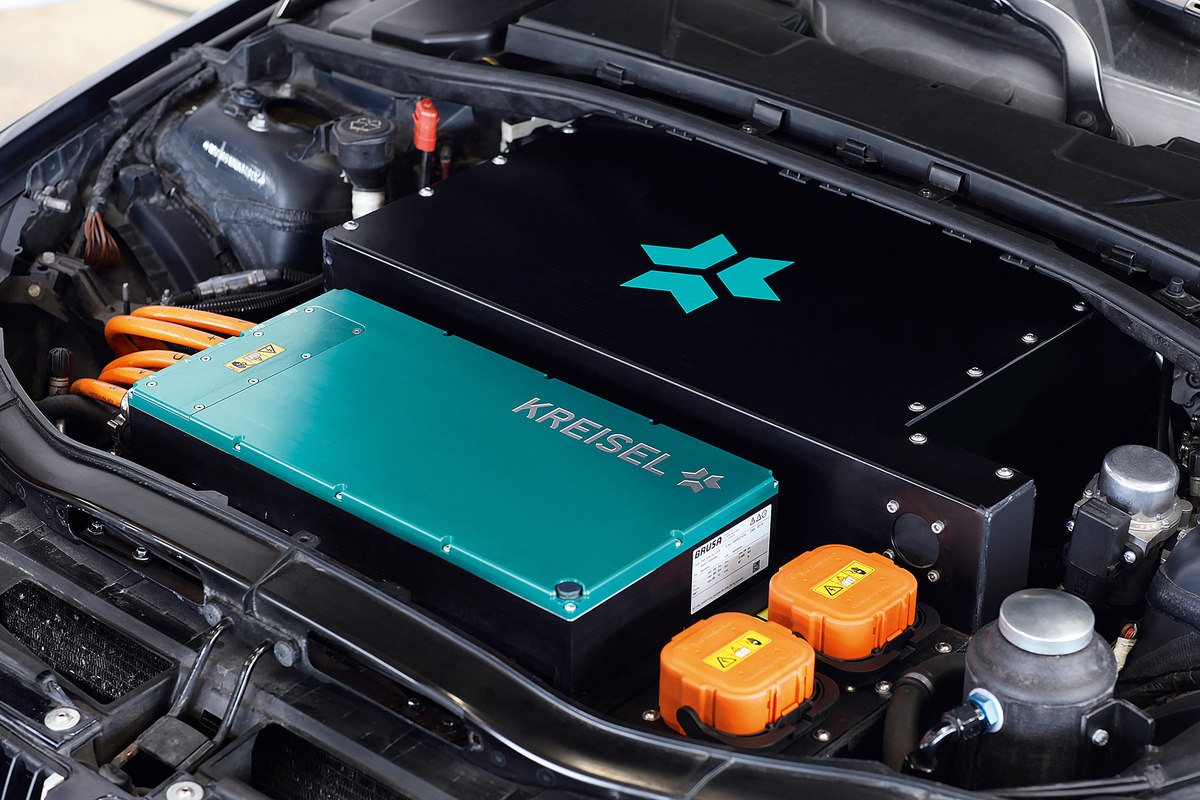Auto executives are traveling to a remote Austrian town where three brothers are designing electric cars they say can go faster and further than anything made by Tesla Motors Inc.
Kreisel Electric GmbH says it’s fielding 20 inquiries a day from automotive icons including BMW AG, Mclaren Automotive Ltd. and Volkswagen AG. They’re asking the Kreisel brothers for help negotiating a U-turn away from fossil fuels to join the electric-vehicle revolution.
“The whole industry is searching, and we actually have the solution,” Markus Kreisel, 37, the middle sibling in charge of sales, said in an interview. “Companies come out and offer us projects. We have no real competitors in terms of the way we do business.”
Working out of a three-door garage, the Kreisel brothers — Johann, Markus and Philipp — are making battery packs and drivetrains for a new generation of plug-in cars, boats and airplanes. Pitching themselves as “E-Mobility Maniacs” at trade shows, they’ve convinced established car companies visit them in Freistadt, 200 kilometers (124 miles) northwest of Vienna, to test drive their creations.
Two years into their venture, Kreisel’s order book is filling up. It’s broken ground on Austria’s first lithium-ion-battery assembly plant, and their workforce is expected to double to 70 employees by the time production starts in the second quarter of next year.
The early success of Kreisel Electric is a sign of how entrepreneurs and smaller companies are starting to disrupt the business model followed by the big names in the century-old automotive industry, said Colin McKerracher, an analyst at Bloomberg New Energy Finance.
“Electric drive trains are simpler and have lower barriers to entry,” McKerracher said. “That is disruptive and will create a lot of new opportunities and alternative business models in the auto industry.”
Kreisel’s strategy is threefold. It makes battery packs and electric drive trains for orders as big as 10,000 vehicles. It designs lithium-battery production lines for original-equipment manufacturers. And it creates prototypes for top-tier carmakers.
“We already have two contracts with two companies, one of which is bigger than Tesla and will actually build 100,000 cars over the next two years,” said Markus Kreisel, who declined to be more specific.
Kreisel Electric burst onto the Austrian and German automobile scene with a reworked Porsche Panamera that outperformed Tesla’s flagship Model S on some measures. The Austrian company says its patented laser-welding and thermal-cooling techniques give them an edge over Tesla because the method preserves the full power of the lithium-ion cells.
The Kreisel garage is located a stone’s throw from a medieval-village moat and near the back end of an alleyway guarded by diesel pumps. A half-dozen of the brothers’ creations were parked outside during a visit in August. Included were a Volkswagen Caddy said to go 350 kilometers without needing a charge and the staff favorite, a Skoda Yeti, that can make it to Munich in one shot, 300 kilometers away.
Why Road to Clean Cars Has So Many Bumps and Curves: QuickTake
“We don’t have the same rules as the big OEMs, so we can do in four months what it takes them two years to do,” Kreisel said.
Kreisel announced its first order last month to deliver as many as 2,000 electric powertrains and battery packs to VDL Groep in the Netherlands for Mercedes Sprinter minibuses.
“We have chosen Kreisel because they have developed a very nice battery with some patented characteristics better than Tesla,” Erik Henneken, business manager at VDL, wrote in a reply to questions. “Kreisel is dynamic startup yet very professional in what they do. They grow rapidly but remain in control.”
Time & Money
Closely-held Kreisel Electric has kept a grip on the business by eschewing bank debt and venture capital. Instead, it taps low-interest state loans earmarked for startups. Markus Kreisel said he knows Austrian Vice Chancellor Reinhold Mitterlehner “very well.”
“We have all the financing we need,” Kreisel said. “We can build our factory off cash flow. What we need is time.”
Their 6,300 square-meter (68,000 square-foot) battery factory will open with initial capacity of 800 megawatt-hours a year, which can be doubled within three months. Kreisel expects to sell 50 million cells or more next year. That’s based on on the size of their lithium-ion configurations and may mean about 6,000 battery packs, according to calculations by Bloomberg New Energy Finance.
100K Threshold
As orders grow, Kreisel anticipates a steep drop in battery prices, from about $140 a kilowatt hour now to less than $100 a kilowatt-hour.
“The sales price today for large volumes over 100,000 cars would already be under $100,” said Kreisel, who buys cells from vendors including Panasonic Corp. and Samsung Electronics Co. “Unfortunately, nobody’s making 100,000 cars today.”
Kreisel doesn’t see the 100,000-car threshold reached until 2019, by which time Tesla will have ramped-up production and German automakers will have entered the fray of the electric-automobile revolution.
“We will sell a lot of electric motors in the next year,” Kreisel said. “We have some really big companies that are going to produce in high volume.”


 Forex2 weeks ago
Forex2 weeks ago


 Naira2 weeks ago
Naira2 weeks ago
 Naira4 weeks ago
Naira4 weeks ago
 Company News4 weeks ago
Company News4 weeks ago
 Billionaire Watch1 week ago
Billionaire Watch1 week ago




 Naira2 weeks ago
Naira2 weeks ago




 Naira4 weeks ago
Naira4 weeks ago




 Naira1 week ago
Naira1 week ago





















